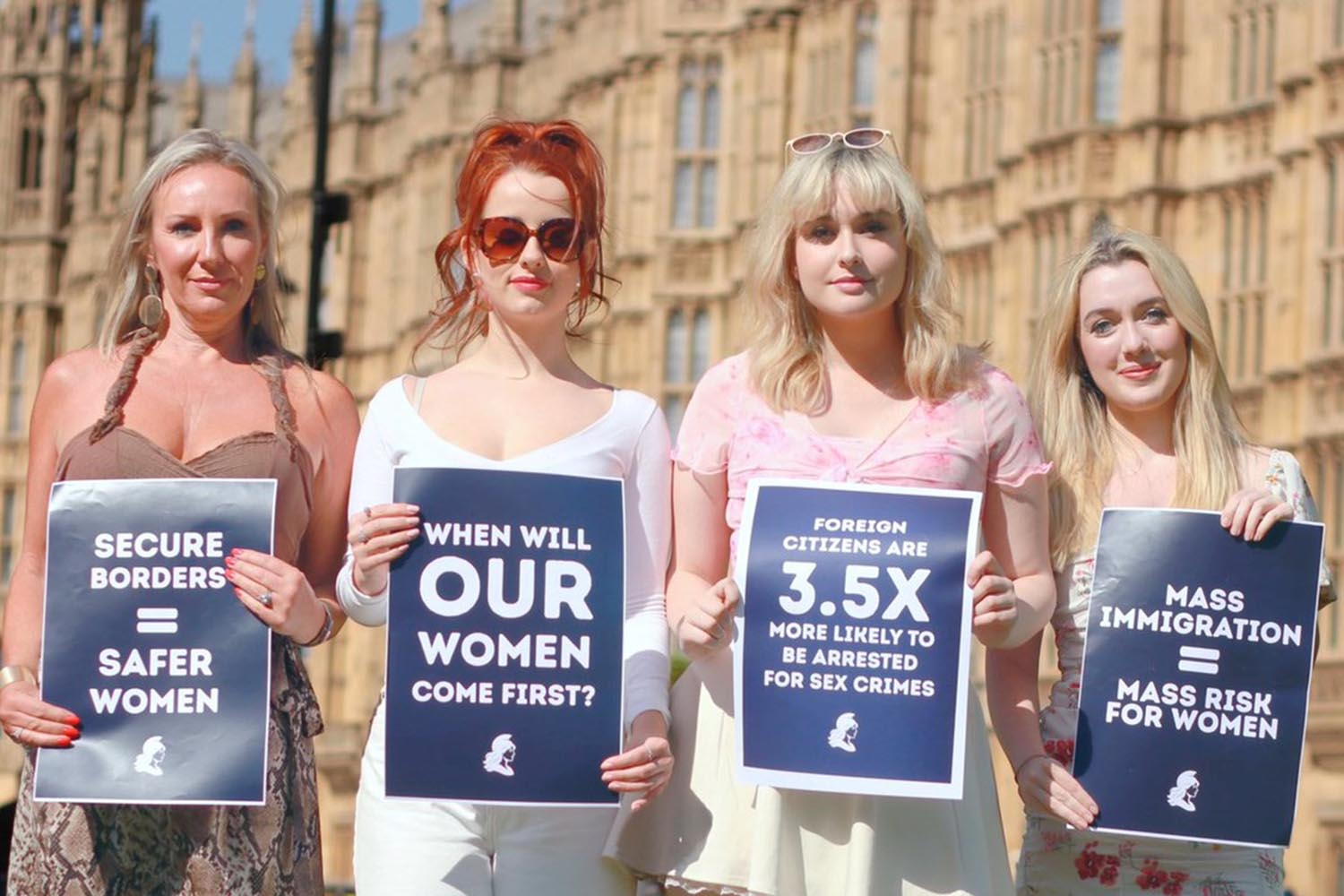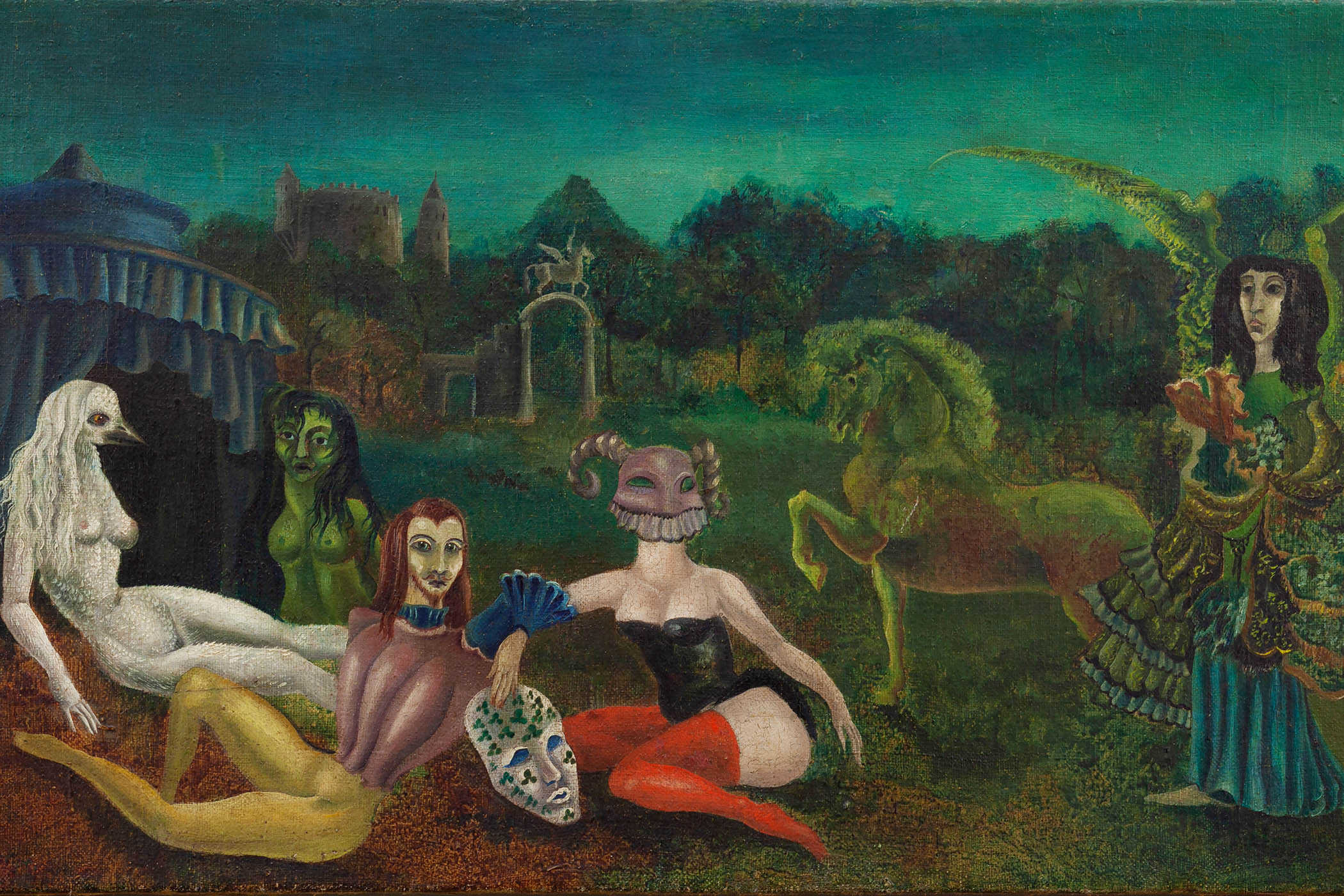The photograph is of women standing outside the Houses of Parliament in June wearing summer clothes. It could blend into an Instagram feed as any other snap of friends getting together, but for the St George’s flags they are holding, and the caption.
“What motivates us?” it reads. “We love our country and want to protect its women and girls. Simple.”
They are the Women’s Safety Initiative (WSI), a grassroots movement whose stated mission is “to expose the dangers of uncontrolled immigration, put women and girls first, advocate for victims, and demand real solutions”. According to a GoFundMe page, they raised £12,000 ahead of their launch and they claim to have more than 500 members.
And their message is spreading. They have gained thousands of followers on social media in recent weeks and last month they met Robert Jenrick MP to discuss their work.
As protests outside hotels housing asylum seekers have spread throughout the summer, one narrative has gained increasing traction: that hotels full of young men are posing a safety risk to British women and girls.
The narrative hasn’t gone unanswered. Last week more than 100 women’s rights groups including Rape Crisis England and Wales and Refuge signed an open letter to prime minister Keir Starmer and home secretary Yvette Cooper arguing that “vital conversations about violence against women and girls are being hijacked by an anti-migrant agenda that fuels division, harms survivors and ultimately impedes the real work of tackling the root causes of society-wide violence”.
The letter adds: “The racist idea that this is solely an imported problem flies in the face of women’s and girls’ daily experiences in the UK.”
The idea has, however, taken hold. Signs carried by protesters outside the Bell Hotel in Epping have displayed slogans including “protect our kids” and “defend our girls”.
A group of “Pink Ladies” has demonstrated outside a migrant hotel in Canary Wharf. Last month, protesters gathered outside a hotel housing families of asylum seekers in Diss, Norfolk, after the Home Office proposed changing the occupants to single men. At a “Women for Reform” conference in London last week Sarah Pochin, Reform’s only female MP, said: “The inconvenient truth for the left is that the culture of men from predominantly Muslim countries is one that holds a medieval view of women’s rights. Women are at risk of sexual assault and rape; hundreds of young men who arrive in this country, housed in our communities, who undoubtedly become sexually frustrated have a warped view of their right to sexually assault women.”
Lois Shearing, author of Pink-Pilled, has studied the ways in which the right has used social media over the past decade to influence and shape discussions on sexual violence.
Newsletters
Choose the newsletters you want to receive
View more
For information about how The Observer protects your data, read our Privacy Policy
“I saw the myth of the evil migrant man so much in my research, in Telegram chats or people arguing that the majority of rape was committed by black or brown men towards white women, when statistically that has no basis,” she said.
“Whenever I see a news report on TikTok about a crime, especially a crime against women, people in the comments are asking, ‘What race? What religion was he? Where is he from?’ It’s everywhere on every news comment section online. The minute something comes out, these far-right groups are trying to spread misinformation to fit this myth that crime is disproportionately committed by black or brown people.”
In a statement the WSI, which launched in April, told The Observer: “The Women’s Safety Initiative was founded to address the exponential growth of women and girls being followed, harassed and assaulted by male foreign nationals.”
A spokesperson for the group said that a poll they had commissioned had shown “almost half of women believe their safety has been adversely affected by uncontrolled immigration of men from countries where women are second-class citizens and with a culture of violence”.
They added: “Home Office-originated data shows that migrants are 3.5 times more likely to be arrested for sex crimes, and our initiative highlights the issue of disproportionate involvement of migrants in sex crimes in relative terms.”
This figure, reported by the Telegraph, was based on 9,055 foreign national arrests for sex offences, which was calculated as 164.6 per 100,000 of the population, compared with 25,680 arrests of British nationals, a rate of 48 per 100,000.
Sara Farris, a sociologist at Goldsmiths, University of London, said Reform UK was using the “trope of foreigners and immigrants as a threat to women’s safety” to clear effect. Across all age groups, the proportion of female voters who support Farage’s party went up nine points between the general election last year and May this year.
“Reform UK has clearly targeted young people by massively investing in its social media presence, especially TikTok. And this is paying off.”
It can be an attractive argument to young people, as well as the more typical Reform voters, Farris said. “Young women and men alike are less and less drawn to the Conservatives and the Labour Party because they can’t see much of a difference between them. Gen Z is a generation with no political loyalties or traditions, and is looking for solutions to very concrete problems: low wages, housing, the environment, discontent with the establishment. That is why, many of them – including young women – are increasingly drawn to parties that are at the far-ends of the political spectrum.”
The idea isn’t new, said Sophie Lewis, author of Enemy Feminisms. “The use of feminisms of fear in the fortification of violent border regimes has a long record in the annals of imperial history,” Lewis told The Observer.
It is not unique to the UK: the Women’s Safety Initiative has met women in France and Germany running similar groups. “Amazing to meet our French and German sisters to come together and talk about how mass immigration is impacting women’s safety,” the group posted in June, also three flag emojis.
The French group, Collectif Némésis, named after the Greek goddess of revenge, was founded in 2019 and described as an “island where feminist castaways can find refuge”. At one of its early gatherings, members carried a placard that read “Rotherham, soon [Paris]”. The German group, Lukreta, which also began in 2019, often uses the hashtags #saveeurope and #patrioticwomen and argues they stand for “healthy feminism” from the right.
Dr Eviane Leidig, researcher and author of The Women of the Far Right said these arguments can reach much wider audiences than ever before. “They are extremely visible as influencers, activists, and politicians… Women in the far right normalise and legitimise extreme views about gender and sexuality, racism, and xenophobia as a deliberate strategy to reach mainstream audiences.”
The impact was already clear, said Shearing. “[This] messaging will have an effect in the real world: we see this with the violence and protests over the summer. What is frustrating is that these influencers will set back discussions on how to actually combat sexual violence and make the world safer for women by 10 years.”
Photograph @womensafety_uk/Instagram



